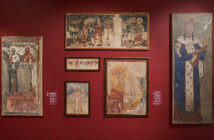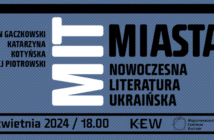![]()
No longer are there small towns where two nations live side by side, fostering their different traditions. On Friday nights and Saturday mornings synagogues were filled with pious Jews, and on Sunday mornings, whole families of Christians went solemnly to church. Before their holidays, Jewish housewives prepared cholent, honouring all the kosher principles, and Christian women made cheesecake. In the month of Nisan before Pesach, Jewish houses were cleaned thoroughly in such a way that no speck of dust was left anywhere. On the beautifully laid table, a cup was left for the Prophet Elijah, and in the Christian homes preparations to celebrate Easter were underway. The Bible was reached for in every house and everybody prayed to the Lord. The prayers merged somewhere high up at the Divine Throne, the customs intermingled, but the atmosphere in both Jewish and Christian homes was similarly familial. The two nations lived side by side for several hundred years, so there used to be many such small towns, such districts, in Poland.
Kraków’s Kazimierz was an example when it existed as a separate town founded by King Kazimierz Wielki (Casimir the Great), but Kazimierz retained its unique atmosphere even when it was incorporated into Kraków in 1800. An aura, difficult to identify, still emanated from the walls of its old tenements, a stagnant presence of a past world and the people who once lived in it. Unfortunately, after the last war, as hardly any Jews survived in Kazimierz due to their murder by the Nazis, the atmosphere of the shtetl slowly diminished year after year, overwhelmed by new investments, bars and crowds looking for entertainment late at night.
Fortunately, there are still a few places that are a reminder of the former residents, as well as cultural institutions and several cafes and restaurants with Jewish music and cuisine. The Museum of Judaism in the Old Synagogue is one of these and an important place for both Jewish culture and memory. Additionally, there are seven former synagogues, as well as the orthodox synagogue Remuh, which remains open, the relatively newly formed Jewish Community Centre (JCC) in ul. Miodowa, the Centre for Jewish Culture in ul. Meiselsa, which has existed for many years, and the Museum ‘Galicia’ in ul. Dajwór.
However, Kazimierz is full of Jewish life for one week every year. It resounds with music, gathers many interested in Jewish culture and traditions who meet at various workshops, meetings, concerts, exhibitions, etc., due to the Jewish Culture Festival, which is held at the end of June and beginning of July. Indeed as was written in the introduction to one of the programmes by Krzysztof Gierat, an expert in film known well beyond Kraków, and the event’s organizer and director, Janusz Makuch, who together were the main instigators behind the event. ‘… we create this festival to preserve love and memory.’ – let us keep this memory alive and pass it on to the next generations.
Let it survive. Shalom! (Z. Łuczyńska)
![]()
„Nie ma już takich żydowskich miasteczek…”
Nie ma miasteczek, gdzie przedstawiciele dwóch narodów żyli obok siebie, pielęgnując swoje różniące się od siebie tradycje. W piątkowe wieczory i sobotnie poranki zapełniały się wiernymi bóżnice, a w niedzielę, uroczyście, całymi rodzinami szli do kościoła chrześcijanie. Przed świątecznymi dniami, żydowskie gospodynie z zachowaniem zasad koszerności przygotowywały czulent, a chrześcijańskie piekły sernik. W miesiącu nisan przed Pesach, domy żydowskie sprzątano szczególnie dokładnie aby nie zachowały się gdzieś w zakamarkach resztki kwaszonego. Na pięknie nakrytym stole stawiano kielich dla proroka Eliasza a w domach chrześcijańskich szykowano się do obchodzenia świąt Wielkanocnych. I tu i tam, sięgano po Biblię. I tu i tam, modlono się do Pana. Modlitwy łączyły się gdzieś wysoko u Bożego Tronu, obyczaje mieszały, rodzinna atmosfera gościła w żydowskich i chrześcijańskich domach. Żyły obok siebie przez kilkaset lat dwa narody, były w Polsce takie miasteczka, takie dzielnice.
Było tak i w krakowskim Kazimierzu, wtedy, kiedy był osobnym miastem przez króla Kazimierza Wielkiego założonym, ale i wtedy, kiedy w 1800 roku przyłączono go do Krakowa., zachował Kazimierz swoją szczególną atmosferę. Wciąż z murów jego starych kamienic emanowała jakaś nieokreślona bliżej aura, jakieś zastygłe obecności minionego świata, i żyjących w nim niegdyś ludzi. Niestety, od czasów ostatniej wojny, gdy już na Kazimierzu zabrakło Żydów, wymordowanych przez okupanta, powoli, rok za rokiem niegdysiejsza atmosfera sztetł kurczyła się, zagłuszana nowymi inwestycjami, barami piwnymi i tłumami szukającymi tu raczej rozrywki do późnych godzin nocnych.
Na szczęście jest jeszcze kilka miejsc, które pieczołowicie przywołują pamięć o dawnych mieszkańcach, placówek kulturalnych i kilka kawiarń i restauracji z muzyka i kuchnią żydowską. Ważnym miejscem dla kultury i pamięci jest Muzeum Judaistyczne w Starej Synagodze, siedem budynków dawnych synagog z czynną ortodoksyjną synagogą Remuh, niedawno powstałe Centrum Społeczności Żydowskiej/JCC/przy ul. Miodowej, a także od lat już istniejące przy ul. Meiselsa Centrum Kultury Żydowskiej oraz Muzeum „Galicja”przy ul. Dajwór.
Co rok natomiast przez tydzień Kazimierz tętni życiem, rozbrzmiewa muzyką, gromadzi wielu ludzi zainteresowanych kulturą i tradycją żydowską, na rozmaitych warsztatach, spotkaniach, koncertach, wystawach, itp. za sprawą odbywającego się na przełomie czerwca i lipca Festiwalu Kultury Żydowskiej. I jak napisał w przedmowie do programu jednego z Festiwali jego współtwórca/głównym pomysłodawcą i twórcą festiwali był znany nie tylko w Krakowie filmoznawca Krzysztof Gierat/i organizator dyrektor Janusz Makuch „…i właśnie po to tworzymy Festiwal by zachować miłość i pamięć.” – starajmy się tę pamięć utrzymać i przenieść na następne pokolenia.
Niech trwa. Szalom!
![]()
„Solche jüdischen Städtle gibt es nicht mehr ….“
Jüdische Städtchen mit der besonderen Atmosphäre, die durch deren Einwohner geprägt wurde, gibt es in Polen nicht mehr. Auch im Krakauer Kazimierz, wo neue Bauobjekte, Unterhaltungslokale etc. entstanden sind, ist die ehemalige Atmosphäre dieses Ortes verblasst. Zum Glück ist sie nicht vollkommen vergangen. Sie wird durch kulturelle Einrichtungen wie das Judaistische Museum und die Zentren der Jüdischen Kultur in den Straßen ul. Meiselsa und ul. Miodowa wachgerufen. Auch in den sieben Gebäuden der ehemaligen Synagogen mit der tätigen Synagoge Remuh in der Straße ul. Szeroka bleibt sie erhalten.
Einmal im Jahr, Ende Juni und Anfang Juli, pulsiert eine Woche lang in Kazimierz das Leben dank des Festivals der Jüdischen Kultur. Es finden zahlreiche Konzerte, Begegnungen, Vorträge, Workshops und Ausstellungen statt. Im Jahre 2017 fand bereits die siebenundzwanzigste Ausgabe dieses Festivals statt, das vor Jahren durch die Herren Krzysztof Gierat und Janusz Makuch initiiert wurde. Diese hatten damals gesagt, dass „das Festival dazu da ist, dass man mit Liebe der damaligen Zeiten und der Menschen gedenkt, die während der Nazi-Okkupation unter dramatischen Umständen von hier weggegangen sind.“ Mögen sie denn in unseren Herzen und unserem Gedächtnis weiterleben, was wir auch auf die kommenden Generationen übertragen sollten. Szalom!









